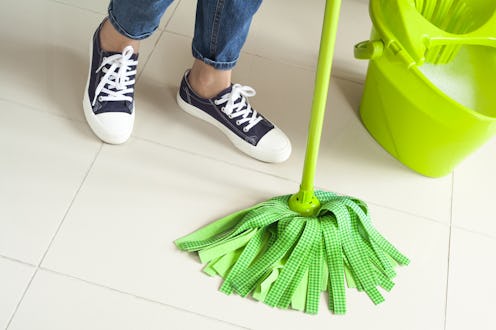
You've probably already heard that women get paid less than men for the same work. But ActionAid's Not Ready, Still Waiting report, which was presented to the United Nations Thursday, has found that women also do more work than men over a lifetime. The report found that women spend, on average, four more years of their lives working — and most of the extra work they're doing is unpaid.
ActionAid used World Bank data on 217 nations and calculated how much men and women worked and made during an average lifetime of 69 years. The findings varied from place to place, but the takeaway was the same in most places: Women work longer than men due to time spent caring for children and other family members, taking care of the house, and doing other unpaid labor. On average, then, women are missing out on $53,228 over the course of their lifetimes.
When we talk about the wage gap, we usually only talk about work that's traditionally paid. But we also need to acknowledge that there's a lot of work women do for no pay at all, like housework and childcare. In fact, women's lower earnings may be related to all the free labor they're expected to do, ActionAid's policy lead Lucia Fry told Broadly.
"Women have this burden of unpaid work that wraps around their entire day," she explained. "Crucially, it limits their opportunities to earn an income, so what we find is that women are often in precarious, vulnerable forms of labor they can fit around their responsibilities, such piecework like sewing or cleaning or tiny roadside businesses that don't make much money at all."
Multiple studies have established that women are expected to devote more time than men to housework and childcare, even when both also hold down jobs. According to the University of Michigan's Panel Study on Income Dynamics, women in the United States gain about seven extra hours per week of housework after they get married, while men save one hour. And according to the American Time Use Survey, nearly half of women but only 20 percent of men do housework each day.
There is some hope that the housework gender gap is improving, though. One study in Demography found that women did less housework in the '80s than in the '60s and men did more, though women still did more than men. And another in Journal of Marriage and Family found that women and men divide the housework more evenly as they get older, at least in Germany.
It's important to remember, though, that women in many parts of the world have it even worse than those in the United States and Europe. In Bangladesh, for example, women will often spend hours getting water for their families and then even more cleaning and working in sweatshops, Fry explained to Broadly. "It amounts to a life of pretty much back-breaking drudgery."
ActionAid's report reminds us that fighting for equality in the workplace requires fighting for equality at home, and to varying degrees throughout the world, that's something we're far from attaining.